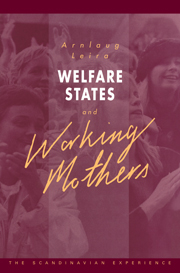Book contents
- Frontmatter
- Contents
- List of figures
- List of tables
- Preface and acknowledgements
- List of abbreviations
- 1 Introduction
- 2 Models of motherhood
- 3 Welfare states and working mothers: the Scandinavian experience
- 4 The collectivization of childcare
- 5 Mothers, markets and the state
- 6 Modes of mothering
- 7 Carer state and carer careers
- Notes
- References
- Index
Preface and acknowledgements
Published online by Cambridge University Press: 05 December 2011
- Frontmatter
- Contents
- List of figures
- List of tables
- Preface and acknowledgements
- List of abbreviations
- 1 Introduction
- 2 Models of motherhood
- 3 Welfare states and working mothers: the Scandinavian experience
- 4 The collectivization of childcare
- 5 Mothers, markets and the state
- 6 Modes of mothering
- 7 Carer state and carer careers
- Notes
- References
- Index
Summary
This book draws upon several years of research dealing with women's organization of everyday life. During this work I was intrigued by the complex efforts involved in reconciling the competing demands of wage-work and caring for young children. Since the 1960s new forms of motherhood have been established in Scandinavia by the women who took up employment whilst their children were still of pre-school age. Contrary to conventional wisdom, my research shows that these motherhood ‘experiments’ were not whole-heartedly supported by the state. This book tells a much more multifaceted story than the one contained in the legend of the interventionist welfare state.
My work concerning the relationship between the working mothers and the welfare state has been greatly facilitated by the generous help and support of many individuals and institutions. Of basic importance are the contributions of the numerous women whom I have interviewed in the course of my research on women's work and care. Without listing their names, I am deeply indebted to them all.
Several persons have read earlier versions of different chapters. I have much appreciated the helpful suggestions of Julia Brannen, Anne Lise Ellingsæter, Helga Maria Hernes, Aud Korbøl, Siri Nørve, Anne-Lise Seip, Clare Ungerson, Cato Wadel and Caroline Woodruffe.
It is a pleasure to acknowledge the valuable discussions with Joan Acker, Kerstin Bohm, David Morgan, Birte Siim, Hildur Ve, Karin Widerberg and Kari Wærness. What might remain of errors of fact or judgement is, of course, my own responsibility.
- Type
- Chapter
- Information
- Welfare States and Working MothersThe Scandinavian Experience, pp. xiiiPublisher: Cambridge University PressPrint publication year: 1992



